My speech [at RMS Conference] was about thefuture of work. Very fashionable subject right now all over Europe. Between the worries of automation and the hippies of freelancization, everyone has their own idea of what the future of work is all about. Everyone is worried but they shouldn’t be.
If you have been following the series of articles I have published about Uber on Medium, you already know the story i’m going to tell. A story starting at the very same place I gave this talk: The CENTQUATRE-PARIS. An historical place for the startups world.
Or is it?
Once upon a time at le web 2008
The entrepreneur in him thought that there was perhaps a way to mix possibilities 2. and 3. This was by buying 10 Mercedes, the drivers of which a potential passenger could contact through an app. Genius! When he told Travis, who was also an experienced entrepreneur, Travis told him he’d better use individual drivers instead of spending his cash on German cars.
I think you already understand that Garrett Camp and Travis Kalanick are the co-founders of the company that would eventually propel them to tied for 48th place in the Forbes ranking of the richest people in the world: UBER.
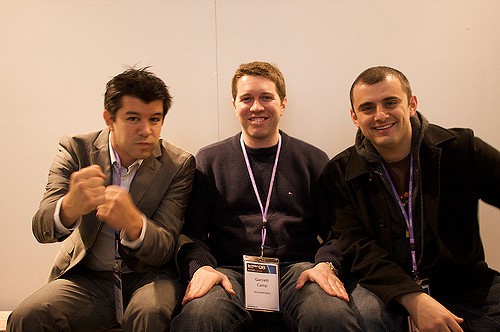
It’s December 9, 2008. Friends Melody, Garrett and Travis are are meeting with their friend Gary. Melody works in the media and Garrett is an employee of Ebay after his company “StumbleUpon” was bought by the merchant site for $ 75 million. Each one lives in remote San Francisco neighborhoods, which makes it difficult to meet up.
For Garrett the situation was clear: There were three possibile solutions to this problem, each while doing it with “style” as he would say:
- Drive his car car. He had recently bought himself a Mercedes but hated driving in town. So no.
- Take a taxi. But the organization of taxis at the time was, well, like Paris [that is to say, chaotic.] Or…
- Recruit a driver to drive his car.
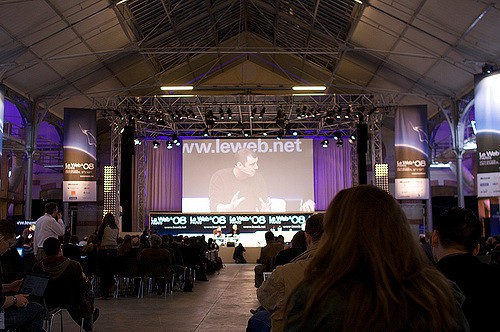
The future of work is already there
The reason I’m telling you this story is that when they were sitting together, these two guys had not expected at all that they were going to shake the global economy, create the uberisation movement and light on fire and the transportation industry.
Yet in 2008, all the elements that were going to create this economic earthquake were there: The iphone, the app store, Google Maps and the Gig Economy. Simply, at the time, we could not connect the dots. […]
Taking the below picture as an example, if Garrett and Travis were painters (or vandal taggers), they did not know what the final painting was going to be like, but they already had a canvas and paint to make it.
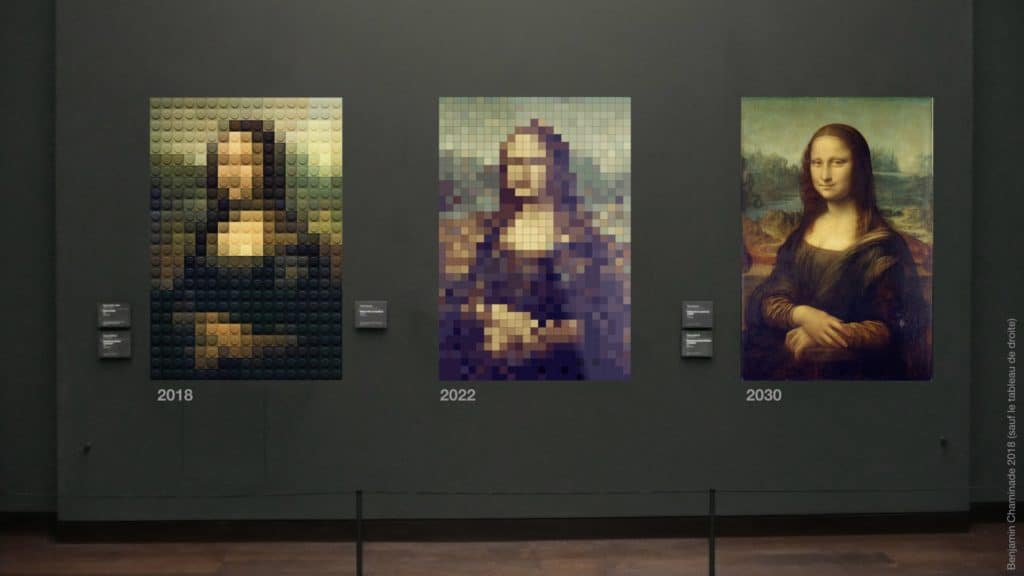
It’s the same for the future of work. Nobody knows what it will look like, yet we can already capture some of it today. Unfortunately, we are not currently able to distinguish what will be important from what will not be.
Take for example the unlimited vacation offered by some startups like Netflix, Indeed or Popchef for 3 years. Presented as innovative managerial practices, they are now denounced as manipulative and hypocritical on the part of the leaders who expect that the employees themselves will not dare or have the opportunity to achieve their goals.
NOWologist, not FUTURologist
The future is built upon the present – so before getting excited about futuristic themes in fashion, let’s look at the different themes presented by so many experts who describe the world of tomorrow.
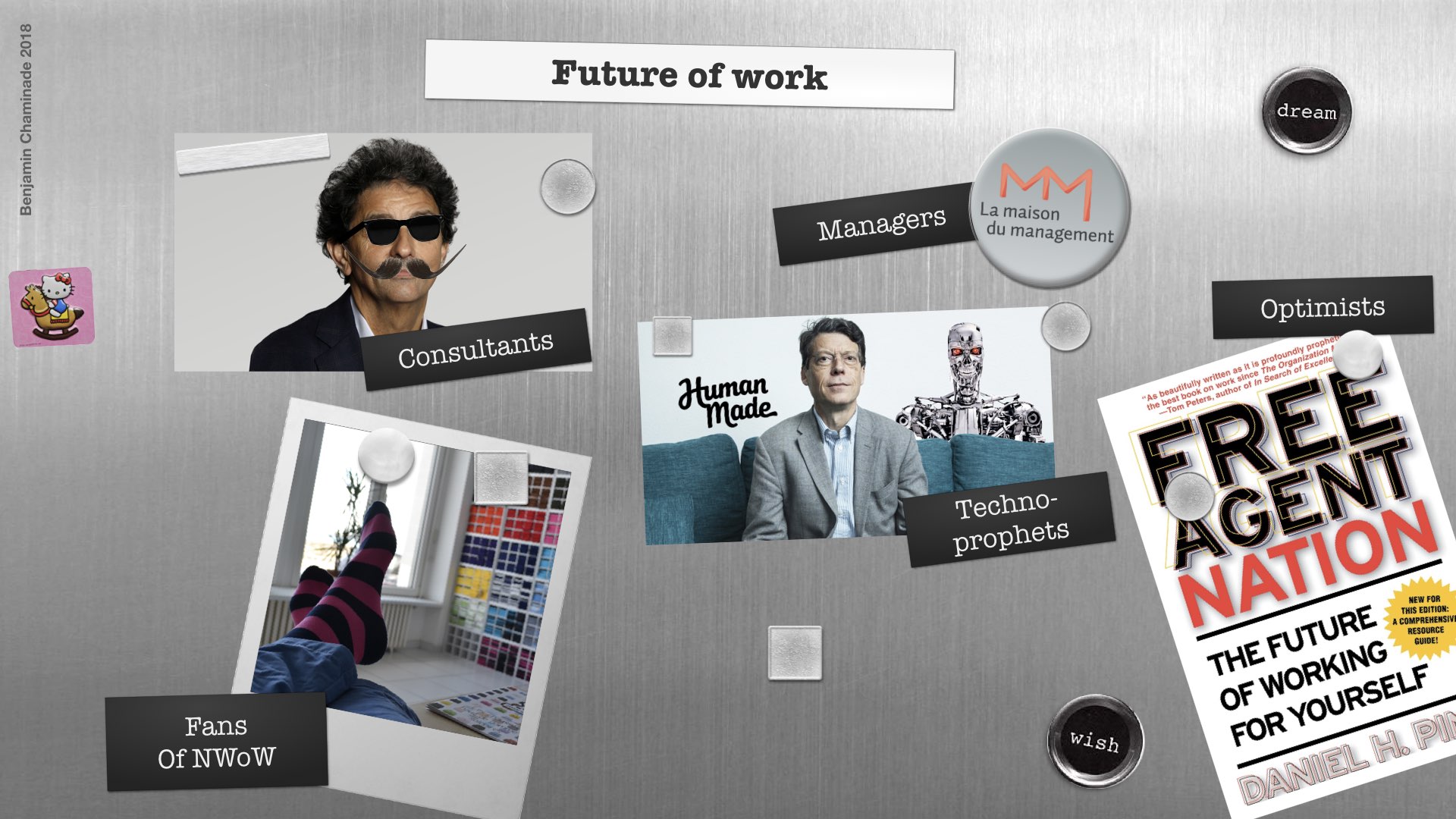
> The Management experts who catalog practices from startups prove that the future will require more Leadership. This is the end of the “soft” manager.
> The Optimists for whom the future will be marked by the end of salaried work in favor of short-term gigs. For them, it is the end of the wage.
> The Anxious technoprophets for which future = Digitization + automation + robotization = Universal income. It’s the end of the human being.
> The New Way of Working (NWoW) fans – for whom the future of work is getting out of the workplace so we can work where we want when we want. It’s the end of the workplace.
Future of work and current practices
On a personal and collective level, the future of his job and the future of the world of work depends first of all on a company’s corporate culture and its ability to assimilate to the current movements that are made up of trends. Take this board :
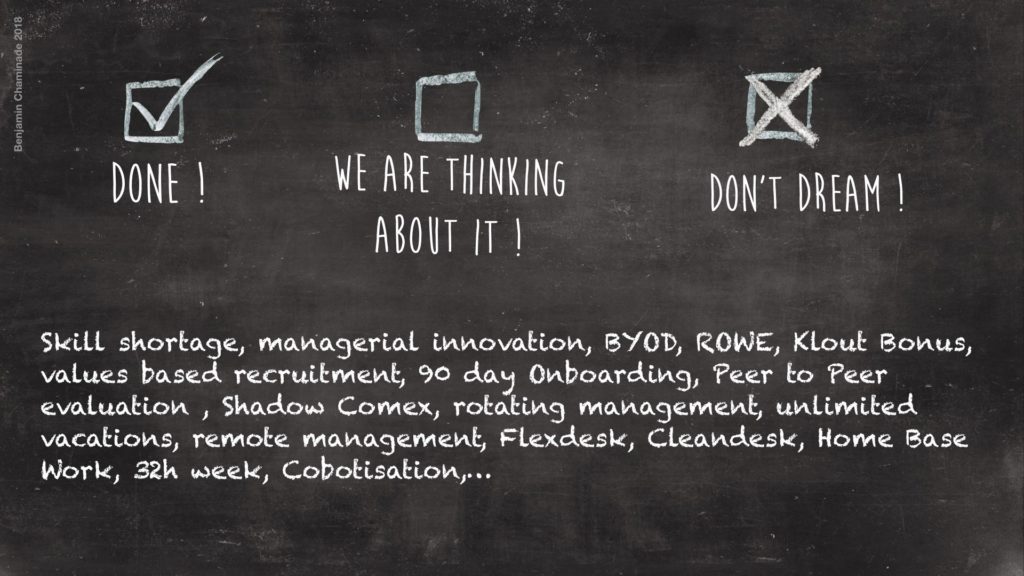
Has your company already implemented some of these trends?
Just common sense, do you think that business leaders who do not see the value of making their organization more flexible, to ban meetings after 18:00 or to think about the steps of managerial innovation will have the same future of work that companies that have embraced this kind of practice for a long time?
YOUR future of work depends on YOUR current managerial practices before depending on the society.
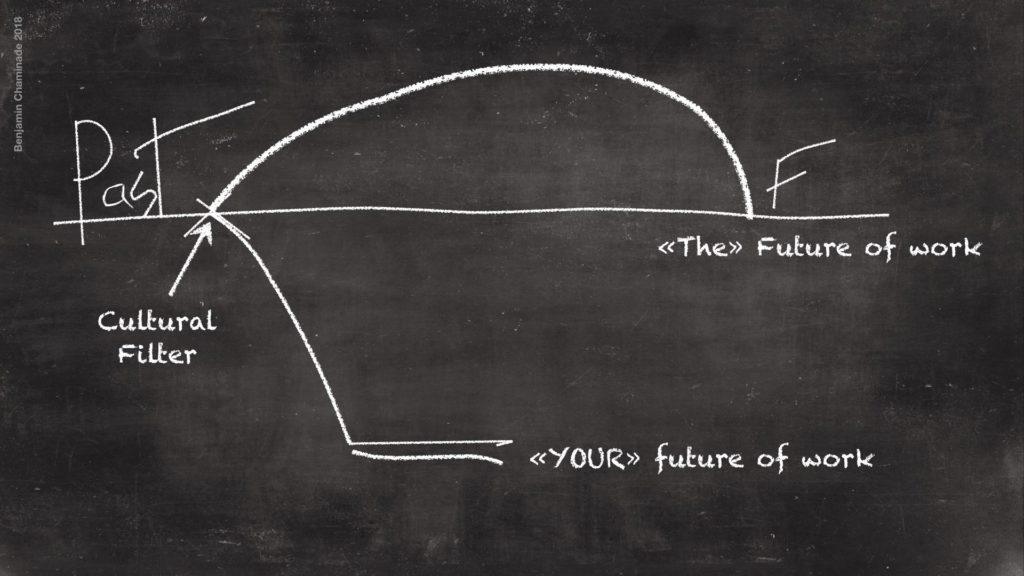
The reason is that the future of your job depends first of all on your corporate culture. Companies that are still at the beginning of their digital transformation in 2018 will not have the same future as those already working on the subject for a long time. If they survive…
Future of work, where to start ?
I propose 3 steps, simple to write but more complicated to implement, to design a future of work that will be in phase with the values of the moment.
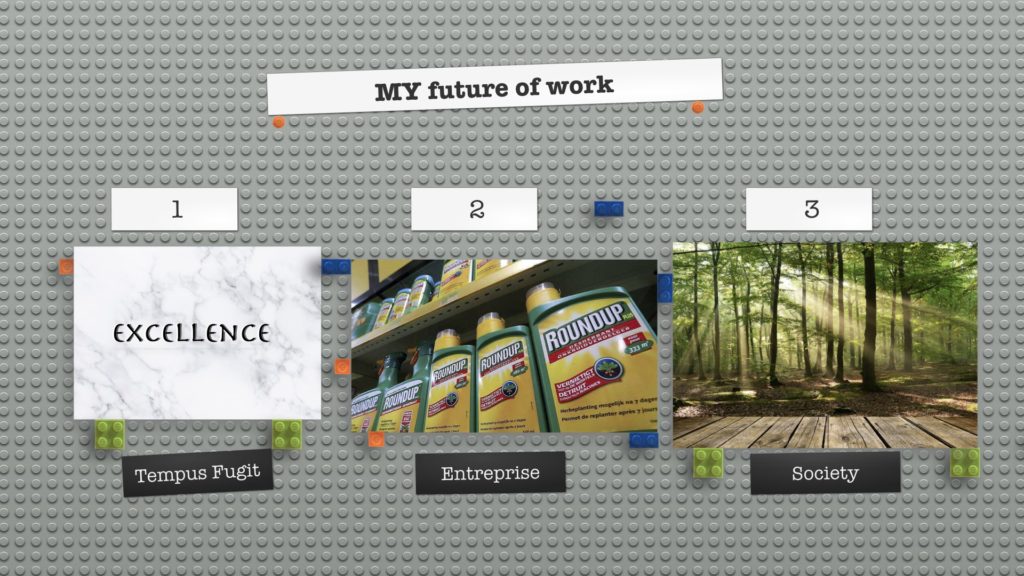
1> Corporate values are no longer etched in marble
They are now listed on a post-it stuck on the fridge door! The company evolves quickly and your company must evolve with it or you will not be attractive to your candidates and will not be able to anticipate the expectations of your customers. I do not say that all its values must necessarily be societal, the weight of the history of the company necessarily has an effect on its values.
2> Identify current societal values
At least, those with whom you are in contact. Invite all your collaborators who are in contact with the outside to a brainstorming session on the subject: your sales teams, recruiters, school ambassadors, … Banish any thought that starts with “Ahhh, the young people of now” or “with ‘time”. Do not judge, watch!
3> Identify the current values of your company
Certainly, fashionable right now. Start by identifying the current AND actual values of your business. Not those listed on your website and that may date a little! Ask around: “If I ask you what are the values of the box, what does it come to you spontaneously? “. You may be surprised…
4> Identify gaps
Take again the societal values that you identified in number 2 and deduce the similarities or differences with yours.
I like to quote the example of this big oil company that used to recruit engineers for a unique career and found itself confronted by web developers interested in the name they could add their portfolio only by having a permanent contract.

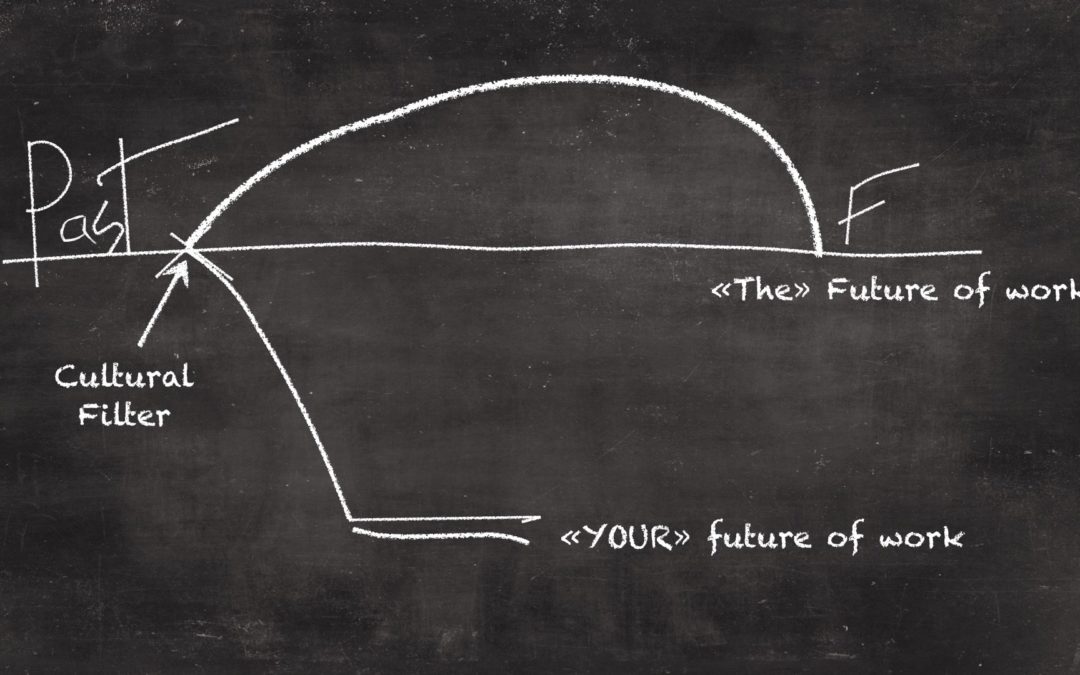
Bonjour, ton blog est très réussi ! Je te dis bravo ! C’est du beau boulot !:) Millie Somerset Jopa
I am not sure where you’re getting your information, but good topic. I need to spend some time learning much more or understanding more. Thank for excellent information I was looking for this information for my mission.